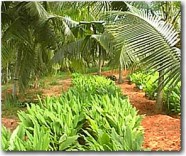|
23 October 2025
|
|
|
മലയാളം
|
|
|
|
|
|
Agriculture > Spices
> Turmeric (Curcuma longa)
|
|
|
|
Crop Management
|
|
|
|
Cultivation Practices

In Kerala and other west coast areas (India) where the rainfall begins early, the
crop can be planted during April-May with receipt of pre-monsoon showers.
The land is prepared with the receipt of early monsoon showers. The soil is
brought to a fine tilth by giving about four deep ploughings. Hydrated lime
@ 400 kg/ha has to be applied for laterite soils and thoroughly ploughed.
Immediately with the receipt of pre-monsoon showers, beds of size 3m x 1.2m with
spacing of 40 cm between beds. Planting is also done by forming ridges and
furrows.
Seed material
|

|
Whole or split mother rhizomes are used for planting and well developed healthy
and disease free rhizomes are to be selected. Small pits are made with a hand
hoe in the beds in rows with a spacing of 25 cm x 25 cm and covered with soil or
dry powdered cattle manure. The optimum spacing in furrows and ridges is between
45-60 cm between the rows and 25 cm between the plants. A seed rate of 2000 - 2,500
kg of rhizomes is required for planting one hectare of turmeric.
|

|
Manuring and fertilizer application
Farm yard manure (FYM) or compost @ 20 tonnes + 1 kg ash + 2 t neem cake +4 t vermicompost /ha.
are applied by broadcasting and
ploughing at the time of preparation of land or as basal dressing by spreading over
the beds to cover the seed after planting. Also use Azospirillum and P-Solublising bacteria (20g/ bed 3 x 1 m ) as nutrient supplement.
Apply N:P2O5:K20
@ 30:30:60 Kg/ha.
Fertilizer schedule for turmeric (per ha)
|
Schedule
|
N
|
P2O5
|
K2O
|
Compost/cowdung
|
|
Basal application
|
-
|
30kg
|
30kg
|
40 tonnes
|
|
After 30 days
|
20kg
|
-
|
-
|
-
|
|
After 60 days
|
10kg
|
-
|
30kg
|
-
|
Mulching
The crop is to be mulched immediately after planting with green leaves @ 12-15 tonnes/ha.
Mulching may be repeated for a second time after 50 days with the same quantity
of green leaves after weeding and application of fertilizers.
Weeding and irrigation
Weeding has to be done thrice at 60, 120 and 150 days after planting depending upon
weed intensity. Earth up the crop after 60 days. In the case of irrigated
crop, depending upon the weather and the soil conditions, about 15 to 23 irrigations
are to be given in clayey soils and 40 irrigations in sandy loams.
Mixed cropping
|
Turmeric can be grown as an intercrop in coconut and arecanut plantations.
It can also be raised as a mixed crop with chillies, colocasia, onion, brinjal and
cereals like maize, ragi, etc. In wetlands, it is grown in rotation with rice, sugarcane,
banana or vegetables.
Turmeric + onion combination recorded an average yield of 16 to 20 tonnes of turmeric
and 2,945 kilograms of onion, fetching the highest net income against net income
obtained from monocropping of turmeric. This highly profitable finding should be
seriously taken note of and implemented by progressive turmeric growers.
|

|
|
|
|
|
Top
|
|
|
|
|
|